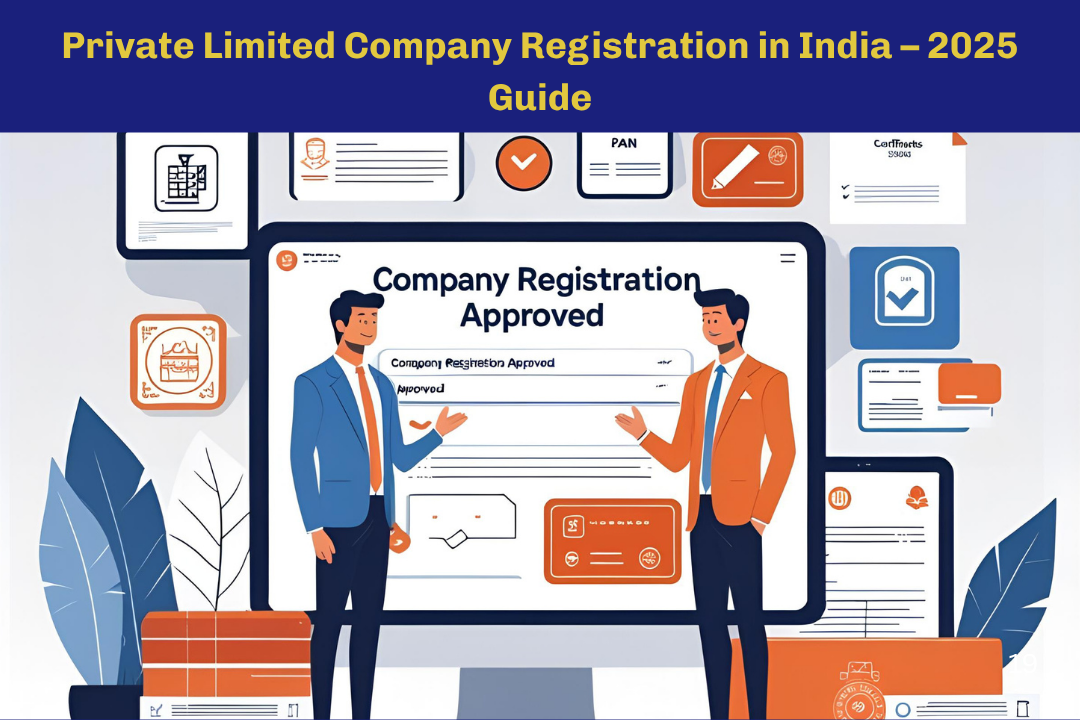LLP vs. Private Limited: Which is Best for Your Business?
By Filing Buddy . 03 Nov 25
LLP vs. Private Limited: Which is Best for Your Business?
Choosing the right business structure is one of the most important decisions every entrepreneur must make before starting operations. The structure determines how your business is governed, taxed, funded, and even perceived in the market. In India, the two most popular options for small and medium businesses are Limited Liability Partnership (LLP) and Private Limited Company (Pvt Ltd).
Both provide limited liability protection, meaning the personal assets of owners are safe from business debts. However, they differ significantly in terms of compliance, taxation, funding, and management. Let’s explore their differences in detail to help you decide which suits your business best.
Understanding the Basics
The first step in starting a business is choosing the right legal structure, as it determines the organization’s liability, governance, taxation, and ability to raise funds. In India, the two most preferred options are the Limited Liability Partnership (LLP) and the Private Limited Company (Pvt Ltd), each offering unique advantages based on business goals.
An LLP is a hybrid business model that combines the flexibility of a partnership with the limited liability of a company. It allows partners to manage the business directly while enjoying protection against personal liability. LLPs are especially suited for professional services, consulting firms, and small businesses seeking simple operations and fewer compliance requirements.
A Private Limited Company, on the other hand, is a structured corporate entity owned by shareholders and managed by a Board of Directors. It ensures a clear separation between ownership and management, making it ideal for startups and growth-driven enterprises that seek funding from investors or venture capitalists.
Both entities are registered under the Ministry of Corporate Affairs (MCA) and offer limited liability and perpetual succession. However, they differ in governance and public disclosure — while an LLP Agreement defines internal management privately, a Pvt Ltd’s MOA and AOA are public documents accessible through the MCA. Ultimately, the choice between the two depends on your business’s scale, funding needs, and long-term vision.
Here’s a quick overview of their legal foundations:
| Aspect | Limited Liability Partnership (LLP) | Private Limited Company (Pvt Ltd) |
| Governing Law | Limited Liability Partnership Act, 2008 | Companies Act, 2013 |
| Legal Entity | Separate legal entity | Separate legal entity |
| Perpetual Succession | Yes | Yes |
| Governing Documents | LLP Agreement | Memorandum and Articles of Association |
Both structures provide perpetual existence, which means they continue to exist regardless of changes in ownership or partners.
Ownership, Management, and Capital Requirements
The management structure is one of the most significant differences between an LLP and a Private Limited Company. In an LLP, the partners both own and manage the business. There is no formal board of directors, giving partners complete operational flexibility. This model suits firms where the founders or professionals want direct control over day-to-day decision-making.
In contrast, a Private Limited Company (Pvt Ltd) follows a corporate governance structure where shareholders own the company, and directors manage it. This separation between ownership and management ensures accountability and smoother scalability — an important factor for startups and growing businesses planning to attract investors or institutional funding.
| Criteria | LLP | Private Limited Company |
| Minimum Members | 2 partners | 2 shareholders |
| Maximum Members | No limit | 200 shareholders |
| Minimum Managers | 2 designated partners | 2 directors |
| Minimum Capital | No minimum required | No minimum required |
If your goal is to keep the business simple, flexible, and low-cost, an LLP offers the ideal setup. However, if you envision structured management, scalability, and external funding, a Private Limited Company provides a stronger framework for long-term growth.
Liability Protection: How LLP and Pvt Ltd Differ
Liability protection is one of the most vital advantages both Limited Liability Partnerships (LLPs) and Private Limited Companies (Pvt Ltds) provide. It ensures that the personal assets of the owners—whether partners or shareholders—remain safe from business debts and lawsuits, offering peace of mind and security for entrepreneurs. However, while both offer this protection, the extent and conditions of liability differ significantly.
1. Limited Liability Partnership (LLP)
An LLP blends partnership-style flexibility with corporate-style protection.
- Limit of Liability: Each partner’s liability is restricted to their capital contribution in the firm.
- Protection from Co-Partners: One partner is not responsible for another partner’s misconduct or negligence. This independence makes LLPs ideal for professional collaborations such as law firms or consultancy practices.
- The Caveat: Partners may still face personal liability in cases of fraud, misrepresentation, or intentional wrongdoing.
2. Private Limited Company (Pvt Ltd)
A Pvt Ltd functions as a separate legal person, distinct from its shareholders and directors.
- Limit of Liability: A shareholder’s liability is limited to the unpaid amount on their shares.
- Corporate Veil Protection: The company enjoys a stronger “corporate veil”, legally separating business obligations from personal assets. It can own property, enter into contracts, and face legal proceedings independently.
- The Caveat: The corporate veil can be lifted if owners give personal guarantees or engage in fraudulent practices.
3. Practical Implications: Choosing Based on Risk
| Structure | Best Suited For | Why |
| LLP | Professional Service Firms (CAs, lawyers, consultants) | Liability is restricted to one’s own actions, not those of co-partners — making it safer for collaborations. |
| Pvt Ltd | High-Growth or High-Risk Ventures | Offers a stronger legal shield through the corporate veil — ideal for startups, tech firms, or capital-intensive industries. |
If your business model involves low to moderate risk and requires flexibility, an LLP suffices. But if you’re entering a high-liability environment or seeking institutional credibility, the Private Limited structure provides stronger, long-term protection.
Compliance and Governance
Compliance cost and complexity are major deciding factors for small businesses.
| Aspect | LLP | Private Limited Company |
| Compliance Burden | Low | High |
| Meetings | No mandatory board or AGM | 4 board meetings + 1 AGM mandatory |
| Audit Requirement | Only if turnover > ₹40 lakh or capital > ₹25 lakh | Mandatory for all |
| Annual Filings | Form 8 & Form 11 | AOC-4 & MGT-7 |
LLPs have minimal compliance and lower cost, making them ideal for small setups. Private Limited Companies, though more demanding, are better suited for scaling and attracting investment.
Taxation Differences: LLP vs. Private Limited Company
Taxation is a critical factor when choosing a business structure, as it directly affects net profitability and cash flow management. LLPs and Private Limited Companies are taxed differently, which can influence your decision depending on your business size, profit distribution strategy, and growth plans.
1. LLP Taxation
Limited Liability Partnerships are taxed at a flat rate of 30% on total profits. A key advantage is that profits distributed to partners are not taxed again, meaning there is no Dividend Distribution Tax (DDT). This setup ensures single-layer taxation, making LLPs particularly tax-efficient for small businesses or professional service firms that regularly distribute profits among partners.
2. Private Limited Company Taxation
Private Limited Companies are subject to corporate tax, which is tiered based on turnover:
- 25% for companies with turnover up to ₹400 crore.
- 30% for companies with turnover exceeding ₹400 crore.
Additionally, dividends distributed to shareholders are taxed again in their hands, resulting in double taxation. While this structure is less tax-efficient for profit distribution, it allows companies to retain earnings for reinvestment and scaling operations, which is advantageous for startups and high-growth businesses seeking external funding.
- LLPs: Ideal for smaller businesses or professional service firms where profits are regularly shared among partners. The single-layer taxation ensures maximum take-home profits.
- Private Limited Companies: Suitable for growth-oriented businesses that plan to reinvest profits or raise capital from investors, as they offer more flexibility for scaling despite the double taxation on dividends.
In essence, taxation strategy should align with your business size, profit usage, and long-term growth objectives.
Funding and Credibility
When it comes to attracting investors, the Private Limited structure has a clear edge.
| Criteria | LLP | Private Limited Company |
| Funding Options | Limited; mainly from partners or loans | Can issue shares, ESOPs, debentures |
| Investor Preference | Less attractive | Preferred by VCs, angels, and banks |
| FDI (Foreign Investment) | Permitted in select sectors | 100% FDI allowed under automatic route |
Summary:
If you aim to raise venture capital, issue ESOPs, or expand internationally, a Private Limited Company is the right structure. LLPs are better suited for domestic, service-based businesses or partnerships.
Ownership Transfer and Business Closure: LLP vs. Private Limited Company
Ownership flexibility and ease of closure are important considerations when choosing a business structure. Both LLPs and Private Limited Companies differ significantly in these areas.
1. Ownership Transfer
- LLP: Transferring ownership in an LLP can be complex. Any change in partnership rights generally requires consent from all existing partners and must be documented through a supplementary agreement or resolution. This can slow down decision-making, especially if multiple partners are involved.
- Private Limited Company: Ownership transfer is simpler and more straightforward. Shares can be transferred (subject to restrictions in the Articles of Association), making it easier for investors to exit or new stakeholders to enter. This structure is more investor-friendly and suitable for businesses planning future equity financing.
2. Closure Process
- LLP: Dissolving an LLP is relatively simpler. Inactive LLPs can be closed by filing Form 24 with the MCA, and winding up involves settling affairs with minimal procedural hurdles.
- Private Limited Company: Closing a Pvt Ltd company is more complex. It typically requires a special resolution, settling debts, and filing for dissolution with the Registrar of Companies (RoC). Active companies may also need NCLT (National Company Law Tribunal) approval, making the process longer and costlier.
If ownership flexibility and ease of exit are crucial, a Private Limited Company is more suitable. Conversely, if you prefer a simpler winding-up process and expect minimal changes in ownership, an LLP offers a more straightforward path.
This distinction makes LLPs ideal for professional services or small businesses, while Pvt Ltd companies are better for growth-oriented ventures with investor involvement.
When to Choose Which Structure: LLP vs. Private Limited
Choosing the right business structure depends on your long-term goals, growth plans, and operational needs. Here’s a practical guide:
Choose an LLP if you:
- Run a professional services firm such as consulting, CA, legal, or accounting services.
- Prefer low compliance requirements and simpler operational processes, avoiding the administrative burden of a Pvt Ltd.
- Want tax efficiency, with profits distributed among partners without facing double taxation.
- Do not plan to seek large-scale external funding or issue equity to investors.
LLPs are ideal for small businesses, boutique firms, and partnerships where flexibility, low cost, and simplicity matter most.
Choose a Private Limited Company if you:
- Operate a growth-oriented startup or a product-based business that plans to scale rapidly.
- Intend to raise capital from investors, issue shares, or offer ESOPs to employees.
- Require a credible structure to build trust with large clients, banks, and international partners.
- Want a formal governance framework that separates ownership and management, ensuring smoother operations and investor confidence.
Pvt Ltd companies are best suited for ventures targeting high growth, external funding, and long-term scalability, where structured management and legal credibility are critical.
Your choice should align with your business model, risk appetite, funding strategy, and operational priorities. LLPs emphasize flexibility and simplicity, while Private Limited Companies support growth, investment, and formal governance.
Conclusion
The choice between an LLP and a Private Limited Company depends on your business vision and scalability goals.
If you’re starting small, focusing on professional services, and want to minimize compliance, LLP is ideal. But if your goal is rapid growth, external investment, or building a strong brand presence, Private Limited Company is the better choice.
In short:
LLP = Simplicity & Flexibility
Private Limited = Growth & Credibility
Contact Us
An expert will call you within 24 hours. No payment required to get started.
Related Post

Private Limited Company Registration in India (2025) – Fees, Process & Documents
Learn how to register a Private Limited Company in India in 2025. Discover costs, required documents, step-by-step process, timelines, and compliance tips.
. 6 Minutes
Launch Your Startup This Diwali | A Shubh Muhurat Guide | Filing Buddy
Thinking of launching your startup? Discover why Diwali 2025 is the perfect 'shubh muhurat for business'. Our guide covers the benefits & how to start for just ₹999.
. 3 minutes
The Ultimate Founder's Checklist (2025): Launch a Business This Diwali
Ready to launch your startup this Diwali? Our step-by-step founder's checklist guides you from idea validation and naming to a simple, all-inclusive legal launch.
. 3 minutes
1.png)
